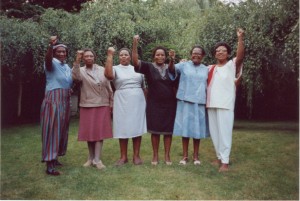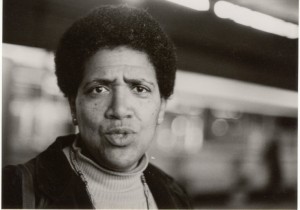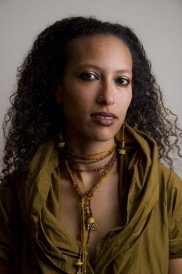There is one path and one path only, it is the path towards embodied liberations
By Jessica Horn
Editors Note: We were scheduled to post a reflection by Jessica Horn later in this second week of our global forum celebrating Audre Lorde’s life and living legacy. However, we recently learned that the Ugandan President *just* signed the Anti-Homosexuality bill into law. There is no time like the present. For most of us, “Today Is Not the Day.” We must use our wherewithal to do whatever we’re able to do to support our LGBTQIA Brothers and Sisters in Uganda whose lives are in grave state sanctioned danger. Family in Uganda are using #IAmGoingNowhere to speak out. If you use twitter and are able, please follow the conversation today and use the hashtag in solidarity.
Without community there is certainly no liberation, no future, only the most vulnerable and temporary armistice between me and my oppression… ~ Audre Lorde

Gloria Joseph, Audre Lorde, Ellen Kuzwayo and other Sisters from South Africa (pre- the ending of the Apartheid regime)
copyright: Dagmar Schultz
I found Audre Lorde as an undergraduate student at Smith College. She was one of the pieces of gold that emerged from a frantic search in libraries, bookshops, classrooms and student organising spaces, a search for echoes of anything that reflected the experience of my feminist left upbringing in what we then called the ‘Third World’, my east African ancestry, the African continent whose liberation I cared so much for, and the new identity of political blackness that I embraced as I came to understand the history of Black, Latina and first Nations struggle in the USA. I was in search of African feminists, of black feminists- and I found poet-philosophers. Yes, I found June Jordan, Sonia Sanchez, Gloria Anzaldua, Chrystos and Sandra Cisneros. And I found Audre Lorde.
Audre Lorde wrote. She wrote and she wrote and she wrote. The volume of her poetic and analytical production in relation to her years on this earth is itself a cause for celebration. She wrote in what feels like a different activist economy, an economy of independent feminist presses, and feminist collectives, left-wing bookshops and social spaces that gave physical ground to intellectual communities. She wrote from the vantage point of a liberated imagination, one that could even name itself as a black, lesbian, mother, warrior, poet- a set of interlaced identities that signaled a unification of ways of being in this world often deemed as mutually exclusive.
These days we obsess about Beyoncés’ feminist contributions as celebrity culture and one-liner politics invade via cyber-space, and as the world burns around us in religious fundamentalist backlash. Audre Lorde’s writing reminds us of the power of depth. Of taking on a part of life and burrowing deep enough that you start to see the interconnections, to see that all the strands of this devastating, complex, beautiful life are in fact woven together. To be able to see how the macro-political and the micro-narratives of our intimate lives connect- that is what Audre Lorde’s work offers us.
Today the President of Uganda Yoweri Museveni signed the Anti-Homosexuality Bill into law. This follows on from the passing of the Anti-Pornography Act in Uganda which enables greater state surveillance of people’s private lives, and echoes the Nigerian Same Sex Marriage Prohibition Act and other legislation in recent years in many other African countries aimed at solidifying exclusion and hatred in law. This legal trend brings into sharp relief the reality that our bodies remain the battlegrounds on which all struggles for patriarchal power and control are waged. Our sexualities are in the focus, with states seizing the sovereignty of our own bodies away from each and every one of us, while paying scant attention to the demands we ourselves put on them around our bodily integrity. We demand quality accessible healthcare, tackling impunity for violence against women and girls and the often appalling treatment of women and girl survivors by police and the courts, and creating economic environments that support our ability to live autonomous, meaningful lives. Instead, we get laws that call for imprisonment and collective censorship of our legitimate desires.
Audre Lorde warned us in her essay on Age, race, Class and Sex: Women Redefining Difference that
unless one lives and loves in the trenches it is difficult to remember that the war against dehumanization is ceaseless.
It feels like everybody is living and loving in the trenches now. Everyone is under attack, regardless of their identities. Its time to rise up, to throw away the silences as Audre encouraged us to, and to realize, as she did, that we may not be able to choose
the time, and the arena and the manner of our revolution… we must do battle where we are standing
____________________________________
Jessica Horn is a feminist writer, activist and consultant. She has worked with community groups, progressive donors, and governmental agencies around rights, justice and the body- advancing sexual rights, ending violence against women, supporting women living with HIV, researching religious fundamentalisms and ensuring women’s rights in conflict-affected contexts. A believer in grounded interventions, her professional engagement intentionally spans policy and community spaces. Jessica is a founding member of the African Feminist Forum. She serves a board member of women’s funds Mama Cash and Urgent Action Fund-Africa, and is a commissioning co-editor of the Our Africa platform on openDemocracy.






Pingback: There is one path and one path only, it is the path towards embodied liberations
Pingback: Afterword: Standing at the Lordean Shoreline - The Feminist Wire | The Feminist Wire